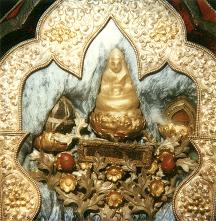Kutsab
(Redirected from Kutsap)

Kutsab (Tib. སྐུ་ཚབ་, Wyl. sku tshab), or ‘representative’ — a statue made in the likeliness of a buddha, yidam or great master. These images are used as objects of inspiration and a source of blessing for Vajrayana practitioners.
Many kutsabs of Guru Rinpoche were made during his stay in Tibet, concealed as earth termas, and later discovered by tertöns. These particularly sacred images were made by Guru Rinpoche and his twenty-five disciples out of sacred substances and relics, and blessed by Guru Rinpoche himself to be his representatives in the future.
Tulku Thondup writes:
- Kutsabs are the most important and rare terma images of Guru Padmasambhava, blessed as his own representatives by the Guru himself. Generally, there are hundreds of terma images of him, but according to many Nyingma scriptures there are only twenty-five kutsab images.[2]
The materials used to make kutsabs include:
- materials gathered by dakinis from celestial realms and sacred places,
- jewels from the gods and nagas,
- gold from the Jambu river and sands of Lake Manasarovar,
- soil from the eight great charnel grounds and twenty-four great sacred places,
- fragrances from a tree of paradise,
- medicinal essences,
- various elixirs and extracts,
- relics from Dzogchen masters (Garab Dorje, Manjushrimitra, Shri Singha, Vimalamitra among others) such as locks of their hair, clothing fragments, bone relics, practice substances,
- Guru Rinpoche's own blood, hair and semen.
Notes
- ↑ Tulku Thondup Rinpoche, Hidden Teachings of Tibet, central pictures.
- ↑ ibid.
Further Reading
In Tibetan
- Chokgyur Lingpa, The Play of Activity: A History of Sacred Substances that Liberate through Tasting and Two Kutsab that Liberate through Seeing (dam rdzas myong grol phrin las rol ba dang/ mthong grol sku tshab rnam gnyis kyi lo rygus)
- Terdak Lingpa
- A Catalogue of Two Images that Liberate through Seeing (mthong grol sku rten gnyis kyi dkar chag, vol. 11:124a–128b)
- The Wondrous Mirror: A Catalogue of Two Kutsab of the Guru (gu ruʾi sku tshab rnam gnyis kyi dkar chag ngo mtshar me long, vol. 12:91a–93a)
In English
- Holly Gayley, Soteriology of the Senses in Tibetan Buddhism, Numen 54 (2007) 459–499.
- Tulku Thondup, Hidden Teachings of Tibet: An Explanation of the Terma Tradition of the Nyingma School of Buddhism (London & Boston: Wisdom Publications, 1986, reprint edition 1997), central images.